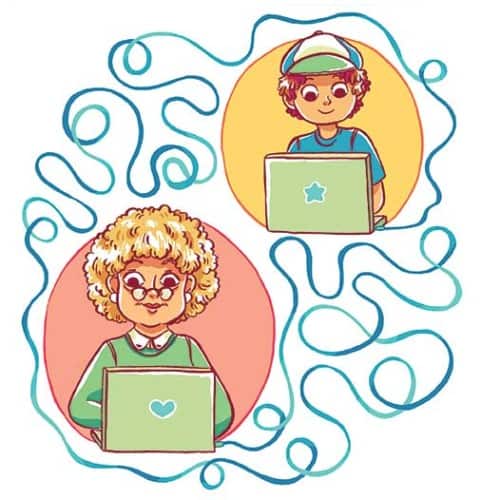INTERGENERATIONAL ALLIANCES
ARE STRENGTHENED BY SEEKING
STORY BY Heather Kirk-Davidoff ILLUSTRATION BY Kelly Miller
SEPTEMBER /OCTOBER 2015
W hen I arrived at my congregation 10 years ago, the oldest member of the community was a 
I know a lot of older people and just about all of them wish they had better relationships with young people. They enjoy their “55 and better” communities, their activities at the senior center and their trips with Road Scholars. But the absence of young people from their daily lives leaves a big hole.
I also know a lot of families (including my own) who live at a distance from parents and grandparents. We miss our relatives and worry about our kids growing up without close relationships with older people.
So how do we connect? How can we foster intergenerational friendships in a world where we are more and more likely to live, work and play in age-segregated groups? We can offer a helping hand to a neighbor or invite an older couple to a family meal. We might even invite an older acquaintance to become “foster grandparents” for our kids. But what would we say or do once we get together?
Back in the day, it seemed obvious. We needed to hang around older people in order to learn how to do things. We watched our grandmothers bake bread or we watched our grandfathers whittle. We sat in and listened as they told stories or sang songs.
But are kids these days interested in such things? Many of the older folks I know find the activities of the younger generation mystifying. What are they doing on those little screens all day? How did they become so confident with devices that befuddle their parents, say nothing of their grandparents?
“The problem with my grandson,” a member of my congregation told me, “is that he already knows everything.”
I knew exactly what he meant, because I knew everything when I was a teenager myself. I would argue with anyone about anything. When I was in eighth grade, my parents signed me up for a confirmation class at our church. Each member of the class was assigned a mentor, an adult in the congregation who was not our parent. Each time we met with our mentors, we were given topics to discuss. This worked well for me because I had all sorts of opinions I was eager to share. My mentor mostly listened.
Then, one week, we were supposed to study a Bible passage together. I was unfamiliar with the reading, but that didn’t keep me from talking about it. My mentor listened to what I had to say and then started asking questions. “I wonder what that word means in the original Hebrew?” she said. I had no answer for once. She didn’t either. Instead, she showed me how to look up words in a concordance and an English-Hebrew dictionary. I was fascinated. That mentor became a lifelong friend.
Maybe what older folks need to teach younger folks these days is how to be a learner.
An older friend of mine decided to get on Facebook or Twitter so that she’ll know what is going on in her grandkids’ lives. She puzzled over how to manage these sites and shared her confusion with her neighbor. The following day, the neighbor’s son came by to help her. She hadn’t had a conversation with him since he was in grade school but now they have something to chat about.
We live in a world with a Wikipedia entry for every topic that might come to mind, with an instructional video on YouTube for anything we wish to create or cook or repair. Maybe these days we need each other not for answers, but for questions. We can express interest in each other’s experiences and then wonder aloud about what it all means. The world of wondering has a spaciousness that is too often lacking in our crowded world of experts. There’s room enough in wonder for us to reach out to each other for connection.*




